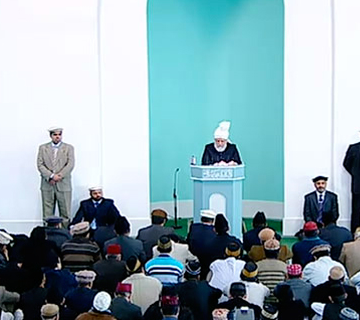Every Ahmadi, who considers himself to have entered the Bai’at of the Promised Messiah(as), undertakes an oath to a spiritual, moral, educational and doctrinal enhancement. Thus, what is required is that after having done the Bai’at, we should endeavour to learn its particulars and that we keep the pledge of Bai’at before us. However, there are many amongst us, who are far away from those standards, which the Promised Messiah(as) desires to see in us. Regarding this, in the conditions [laid out] by him, the matters towards which he has drawn our attention are for instance as follows:
One shall not lie. One shall not be cruel. One shall refrain from dishonesty. One shall not permit oneself to be carried away by passions. One shall, under the impulse of any passions, cause no harm to people in general, and Muslims in particular, neither by one’s tongue nor by one’s hands. One shall not be arrogant. One shall be humble. One shall always live one’s life amiably. One shall endeavour to benefit mankind in general.
If we were to pay heed to these matters, then as I mentioned, we can raise our moral standards; we can inculcate high morals in ourselves. However, if we analyse, [we will see that] even amongst us there is an alarming number of people, who despite the pledge of Bai’at, do not act upon these matters. Some people twist their words in such a way that they become void of truth and come close to lying. At times, some people, to seize their rights even commit cruelty. At times, some people commit dishonest actions and dishonestly present false witnesses to save themselves. If not with hands, then at least, most inflict pain upon others with their tongues to achieve their goals. Arrogance takes over instead of exhibiting humility. when certain matters relating to Qadhai.e. Jurisprudential affairs are presented before me, I have observed that rather than trying to establish the truth and identify the lies instead people display such stubborn attitude to win their rights that one is astounded.
Instead of establishing their businesses on the foundations of truthfulness, they are more inclined towards obtaining personal interests. Furthermore, the appointed lawyers by both parties make such false claims which are based on lies simply to demonstrate their professional skills and in order to prove their superiority. However, Ahmadi lawyers as well as both parties must give preference to their pledge Bai’at [initiation] and the fear of Allah the Exalted over their personal interests. When a conflict arises, then it is the duty of a believer, for the sake of acquiring the pleasure of Allah the Exalted, to develop kindness within himself. Furthermore, the objective should be that we are brothers and we must live together with love and affection by removing these misunderstandings or just or unjust grievances. However, sometimes people have big egos and stubborn attitude, in that case, these complaints never come to an end. Thus, if we wish to resolve these conflicts in the best possible manner, we must be lenient towards the other party and try to partly sacrifice our due rights at times to promote harmony. What does Allah the Exalted teach us with regards to this? Allah the Exalted says: ‘And if any debtor be in straitened circumstances, then grant him respite till a time of ease. And that you remit it as charity shall be better for you, if only you knew.’
You must realise that we can fall on hard times too and above everything else, you must also realise that if Allah the Exalted, Who is Omnipotent, begins to punish us in our dealings, we will have no place of refuge. Thus, it is necessary for us to deal with others with gentleness and leniency. This is a general guidance for our daily dealings, our businesses and loans and repayments. And this should always be remembered.
The Holy Prophet (saw) also repeatedly drew the attention of believers to the fact that you should act with mercy and kindness in this world as in return, God the Exalted will also have mercy upon you in heaven. We should always remember that we will also be held accountable one day. Thus, in order to absorb the mercy and forgiveness of Allah the Exalted, we must demonstrate mercy and kindness in our dealings with one another in this world, rather than merely demonstrating harshness, punishment and the concern for our personal rights.
The Holy Prophet (saw) has given glad tidings of rewards to those receiving the repayment of a loan, who treat those repaying the loan with kindness. In a narration, it is mentioned that the Holy Prophet (saw) said that if a person wishes to receive the repayment of loan from an individual and he gives him further respite after the agreed upon time [of returning the loan], every day of respite will be counted as charity for him. On another occasion, the Holy Prophet (saw) said that charity and almsgiving remove your trials, difficulties and hardships.
Some people are so stubborn and obstinate that they question any decision made by the Qadha Board, even if I make a decision, they stubbornly ask for a review of the decision! I do not say that decisions of the Jurisprudence Board are one hundred percent correct. But nonetheless, they are correct eighty or eighty five percent of the time. Even if they are incorrect, their intention cannot be doubted. These people pass decisions with pure intentions. Therefore, if a party believes that it is in the right, yet, the decision is passed against it, the Jurisprudence Board or the judge should not be criticised for this. Thus, one should refrain from ill thinking as this opens the path to another vice.
Most matters of conflict involve financial settlements be it trade, divorce, domestic or others. It is a good practice to show leniency towards those who are owed money. One example of that is to demand unreasonably high Haq Mehr from the husband that is beyond his means, or expect settlement of loan at a time when the other person cannot afford to repay.
When we Ahmadis tell the world of a peaceful society then we too should be trying to establish harmony in all our affairs in society. Remember, a peaceful society will only be established with the (good) behaviour of both parties – the lender being lenient about the repayment of loans and the borrower by being responsible, and showing concern for its repayment.
Hence, by taking the Bai’at of the Promised Messiah (as) we must also instil this realisation within ourselves. Therefore, believers should be active in fulfilling the rights of others. There isn’t just one incident, but there are many. Therefore, when cases go to the Jurisprudential Board, or are presented to the Khalifa of the time, everything should be based on truthfulness instead of later allowing the Khalifa of the time to be embarrassed by his words. You should endeavour to protect him from being embarrassed. Among the Promised Messiah’s conditions [of the Bai’at] is that he/she shall refrain from creating disorder. Regarding this the Holy Prophet (saw) has advised us as it state in one of the narrations that the Holy Prophet (saw) said: ‘It is a great injustice if a wealthy person doesn’t repay his debts and presents all sorts of excuses. If you are told pursue and follow up a person who presents such excuses then you should do so.’ In other words, one should strongly urge him to repay the loan. Furthermore, the Holy Prophet (saw) has stated: ‘one who has to repay a loan but delays its repayment by presenting trivial excuses becomes deserving of losing his reputation and punishment.’
Thus, if one’s intentions are pure then Allah the Almighty shall create the means and provisions [for its repayment] or will soften the heart of the one who gave the loan. However, if one has ill-intentions then Allah the Almighty punishes such a person. The Holy Prophet (saw) would generally not offer the funeral prayer of a person who was in debt and his wealth and money available to him was not enough to repay it. The Holy Prophet (saw) also used to read a prayer to safeguard himself from taking a loan. In fact, he associated Kufr [disbelief] and the taking of loans. In one of the Hazrat Aishah (ra) states: ‘The Holy Prophet (saw) used to recite the following prayer in his Salat: ‘O Allah! I seek refuge with You from sins and taking loans.’ Someone then said: ‘O Messenger of Allah! You seek so much protection from taking loans?’ The Holy Prophet (saw) replied: ‘When a person owes a debt then he utters falsehood when he speaks and after making a pledge then breaks it.’
Thus, this is the reason to seek protection from this and those who take loans should try their utmost to not take loans. However, if they do take a loan then they should be concerned about its repayment. Therefore, the members of the Jama’at need to pay a lot of attention towards this. Hazrat Khalifatul Masih I (ra) has given advice in this regard. Many people write to me regarding debts therefore they should follow this advice. Hazrat Khalifatul Masih I (ra) states: ‘Firstly, do a lot of Istighfar[Seek forgiveness from Allah the Almighty]. Secondly, stop overspending or spending aimlessly, ‘thirdly, even if you save a small amount of money then you should pay it towards the repayment of the loan.’
An individual wrote to me saying: ‘I own a car, but I prefer such and such model. However, I do not have enough money to buy it. Can I take a loan from the bank to buy that car?’ If someone takes a loan once, they will eventually become further immersed in it. Therefore, one should eschew such vain desires.
Similarly, many youths have started business without any experience. They take certain sums of money from people for their business, yet due to their inexperience the business collapses and they not only become helpless themselves, but they also waste other people’s money. These people [youths] should be more careful and the people who give their money should think twice about giving such [personal] loans, rather than making complaints or filing a case against them. As those that wish to put their money towards a business, they lose their own money, as does the poor helpless individual who took the money (in fact he is not helpless, rather sometimes people take money with mischievous intentions or evil intentions) and then they embroiled in a court case which results in their disgrace and humiliation. Nevertheless, we should avoid these things so that we can create a peaceful environment around us.
May Allah the Almighty enable us to inculcate the true spirit of a believer within ourselves and may we create a peaceful society. May we adopt the highest of morals and etiquettes that are expected of us by the Promised Messiah, that were mentioned in the Holy Quran and reiterated to us by the Holy Prophet (saw).


